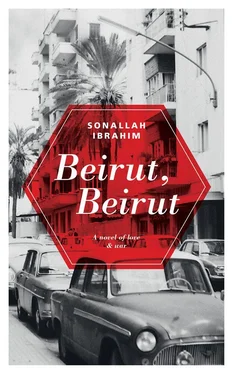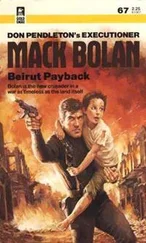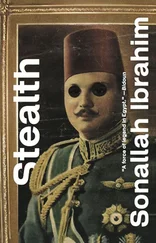Over the course of the following months, there was a flurry of secret communications, capped by a secret meeting between Moshe Dayan, Israel’s minister of defense, and King Hussein of Jordan on August 24, and between Dayan and King Hasan of Morocco the next month.
Two months later, on November 19, 1977…
Jerusalem Airport. President Sadat comes down the stairway from his private plane (which cost 12 million dollars, paid for by the Saudis) with Ephraim Katzir, president of Israel, beside him.
Title card:
On the first visit of its kind by an Arab president, and under the slogan of “Permanent peace at any price”, and under the auspices of American hegemony, Sadat acknowledged the historical right of the Jews in Palestine, and in the Holy City, not to mention the right to the presence of Zionist settlers.
This admission was the turning point. Begin started talking about acknowledging the right to the presence of the Palestinians who remained until Zionist occupation, in the form of a plan of self-administration for the inhabitants of the West Bank and the Gaza Strip. As for those who were not under Zionist occupation, they had no right to Palestine, and had to be dissolved into the state they were living in.
The Israeli Knesset. Sadat makes a speech, declaring: “There will be no other wars… between Egypt and Israel…”
Title card:
A few days before…
Israel began testing Kfir planes, which were produced in their factories, in a surprise attack on the village of al-Izziya in southern Lebanon.
Headline in the Israeli newspaper Yedioth Ahronoth : “The leader of the Kfir squadron states that the execution was flawless, and the advanced systems worked outstandingly.”
Jerusalem Airport. Sadat prepares to board his plane to head back to his country. He shakes hands with the leader of the Israeli Kfir squadron which attacked the village of al-Izziya; he himself is entrusted with accompanying Sadat’s plane in the sky over Jerusalem.
A circle around a paragraph from an article with the byline of the journalist Jim Hoagland, in the Washington Post : “Investigations carried out by Congress, by way of the committee headed by Senator Frank Church, with some of the CIA leadership, have confirmed that King Hussein received sums of money from the CIA. While Gamal Abdel Nasser tried to bring down the conservative Saudi regime in the 1960s, Kamal Adham, the director of Saudi intelligence and its liaison officer with the CIA, was able to mobilize the greed of Sadat, who was vice president of Egypt at that time. At one point, Adham provided Sadat with a fixed personal income, according to a well-informed source who refused to provide detailed evidence.”
Ismailia. The Egyptian president’s luxury retreat. Sadat and his wife welcome Menachem Begin and his wife on Christmas Day, 1977. An open-air press conference. Sadat reads from a piece of paper: “We have agreed that the war of October, 1973 will be the last war between Egypt and Israel.” Directly behind Sadat in the photograph, Moshe Dayan’s black eyepatch can be seen.
Title card:
Two and a half months later…
South Lebanon, near the Israeli border. Small green tobacco shrubs spread out on the hills and lowlands. Entire families bent over doing farmwork. Camels and beasts of burden. Farmers lie down on the ground, in front of baskets of figs, grapes and prickly pears that they sell with the skin on. Palm fronds and orange tree branches. The Mays al-Jabal pond. Lebanese women wash clothes and household dishes in the muddy waters. Pack-animals drink from the same water. On the surface of the road Palestinian nationalist slogans have been drawn.
A young Lebanese woman wears a blouse with rolled-up sleeves. Her head is wrapped in a large kerchief tied behind her hair. In front of her is a long low board. On it is a layer of flour. To her right is the oven, consisting of two pieces of stone supporting a brass tray. The woman flattens a piece of dough on the low board, then spreads it out on the tray so it covers its entire surface.
The same place after sunset. The farmers return to their homes. The roads gradually empty out. From one house comes the sound of a girl singing:
‘‘Oh Mama, from Tel Zaatar
I’ll send you a letter
From a green tent
To tell you what it’s like here.
Oh Mama, from Tel Zaatar
Rockets burns the houses.
Oh Mama, the wounded are dying
Beirut wails and weeps
There’s no more houses there…’’
Darkness wraps itself fully around the roads. The howling of a wolf echoes in the distance.
Title card:
And suddenly…
Illumination bombs rain down one after the other on the fields. Massive explosions. Tongues of flame dart out in every direction.
Title card:
At 1 am on March 15, 1978, the concentrated Israeli attack began for the operation which computers had electronically assigned the name “Father of Wisdom”, but which afterwards was known as Operation Litani. Thirty thousand soldiers participated in it, reinforced by planes, tanks and squadrons. The stated goal of the operation was “creating a security zone 10 kilometers deep”.
Some hours later, Begin issued a statement in which he said, “There are days in which all citizens of Israel, as well as those of goodwill in different countries, say: ‘Full respect to the Israeli Army.’ And this day is one of those days. Over the last twenty-four hours, in poor geographical and air conditions, the Israeli Army has accomplished the task which the government placed on its shoulders, along a 100-kilometer-wide front.”
A circle in pen around a paragraph from a book by Ezer Weizman, The Battle for Peace : ‘‘A few minutes after the first Israeli tank crossed the border into southern Lebanon, the telephone rang in the office of Eliazer Raymond, the head of our delegation in Cairo. In spite of the late hour, the leadership in Tel Aviv issued instructions to Raymond to call the head of the Egyptian spy services — General Shawkat — to deliver to him an important message. Raymond notified Shawkat: ‘A short time ago, our forces began a limited operation on the Lebanese border to remove terrorist bases from the region. I hope that this limited operation will not hinder the talks between our two countries.’ ’’
Dust-yellow Israeli Army tanks advance along a country road. On both sides are Palestinian children, handcuffed and blindfolded. Fires consume entire villages. People run in fear. Houses collapse. Blood on faces. Corpses in the road. A three-year-old girl with blood gushing from her severed leg. A gunman wearing Palestinian insignia fires from the top of a hill. A mortar strikes the hill and it explodes.
A circle in pen around a paragraph from the memoirs of Muhammad Ibrahim Kamil, Egyptian foreign minister: “The morning after the Israeli invasion… I called President Sadat in his presidential retreat in El-Qanater El-Khairia to show him the statement I’d prepared… concerning the attack… but I wasn’t able to talk to him because he was still sleeping. After that, I continued to try to reach him several more times, at regular intervals, but without success… So I went ahead and published the statement without waiting for Sadat’s opinion about it, since the situation was embarrassing to Egypt, especially in the eyes of the Arab world…
“At 1.30 in the afternoon, Sadat called me at the ministry and asked me in a yawning voice why I had been trying to reach him by phone several times that morning, and I replied that it concerned the Israeli attack on Lebanon.
“With a laugh, Sadat said: ‘Have they given them their thrashing yet?’ I didn’t know what he meant by that, so I asked him, ‘Sir?’ And he replied, ‘I mean, have they taught them a lesson yet or not?’ And I finally understood that he meant, ‘Have the Israelis taught the Palestinians a lesson?’”
Читать дальше












